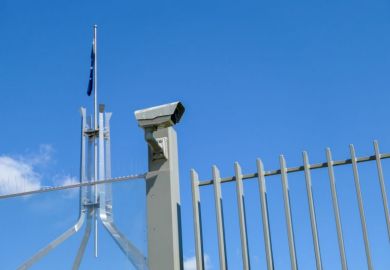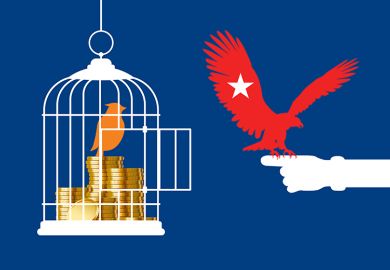The government has been accused of “outrageous interference in a university’s autonomy” after documents revealed that London Metropolitan University faced “almost inevitable” insolvency by failing to regain its visa licence unless it removed a controversial governor from its board.
Jawad Botmeh was found guilty in 1996 of conspiracy to cause explosions in connection with two car bombings, one outside the Israeli Embassy in London, although he has always maintained his innocence.
In January 2013, having been employed by the university as a research manager for five years, the Palestinian was elected by staff to serve on the university’s board.
The following month, the university suspended Mr Botmeh over the conviction alongside Max Watson, then chairman of London Met’s Unison branch, for his role in giving Mr Botmeh a job.
After protests from supporters including MP Jeremy Corbyn, now leader of the Labour Party, London Met lifted both men’s suspensions and said that Mr Botmeh was entitled to remain a governor.
But it has emerged that, according to council minutes, the Home Office’s now-defunct UK Border Agency pressured London Met into removing Mr Botmeh from his elected role as a governor - which automatically made him a director of the university - because of concerns about his previous conviction.
Minutes of a board meeting on 14 March 2013, the first meeting Mr Botmeh attended, show that the governors discussed “feedback received from the UKBA with regard to Jawad Botmeh serving as a director of the University”.
“The UKBA had made it clear to the University that Jawad’s continuation as a director would lead not only to the refusal of the new application for a Tier 4 licence but to the revocation of the existing Tier 2 licence,” the minutes state.
At the time, London Met had applied for a new Tier 4 licence to sponsor international students, having been stripped of it the previous year. A Tier 2 licence allows a body to sponsor working visas for non-European Union nationals.
“Regaining the university’s Tier 4 licence was critical to the future financial survival of the institution – without it, insolvency was almost inevitable,” the minutes note. Governors were told that they would be asked to consider “two formal resolutions concerning the removal of Jawad as a director”.
During the meeting, Mr Botmeh raised issues of “due process” and “fairness” and asked for more time to consider his position and a statement in writing from the UKBA to share with his solicitor.
But he was told that the university had been informed that the matter “would be placed before a minister at the weekend for a decision; the impact of which could be devastating for the university”.
The minutes show that a number of governors warned of the “unpredictability of the situation” and the “clear political dimension” of any decision on their Tier 4 application.
After further consideration, Mr Botmeh agreed to resign with immediate effect because he “did not wish personally to be blamed” if the application was rejected.
Mark Campbell, the chairman of the University and College Union at London Met, said in a statement that the UKBA had engaged in “unprecedented and outrageous interference in a university's autonomy as to whom among its bonafide staff it could have democratically selected as its elected staff governor”.
“We are shocked to discover the welfare of hundreds of our existing and future international students was used as a bargaining chip in what appears to us an exercise in governmental bullying and extortion,” he said.
A spokesman for the national UCU added: “Ministers should not be holding universities to ransom over decisions about who sits on their governing bodies."
According to the Home Office, when the university applied for a new licence it declared that Mr Botmeh had been a governor, but that he had been removed. The department also drew THE’s attention to guidance that potential visa sponsors must adhere to.
Current guidance for the awarding of a Tier 4 licence says that the Home Office can take into account unspent criminal convictions (which include those with prison sentences of 30 months or more) when considering an application.
In a response, a spokesman for the university said that it was “absolutely right for London Metropolitan University to act in accordance with UKBA guidance”.
“The publicly available board minutes show that is precisely what the university did, and that everyone involved acted fully in the interests of London Metropolitan University.”
In April 2013, London Met regained its licence to sponsor international students. Mr Botmeh did not respond to a request for comment from THE.
POSTSCRIPT:
Print headline: Government leaned on London Met to remove governor
Register to continue
Why register?
- Registration is free and only takes a moment
- Once registered, you can read 3 articles a month
- Sign up for our newsletter
Subscribe
Or subscribe for unlimited access to:
- Unlimited access to news, views, insights & reviews
- Digital editions
- Digital access to THE’s university and college rankings analysis
Already registered or a current subscriber?




